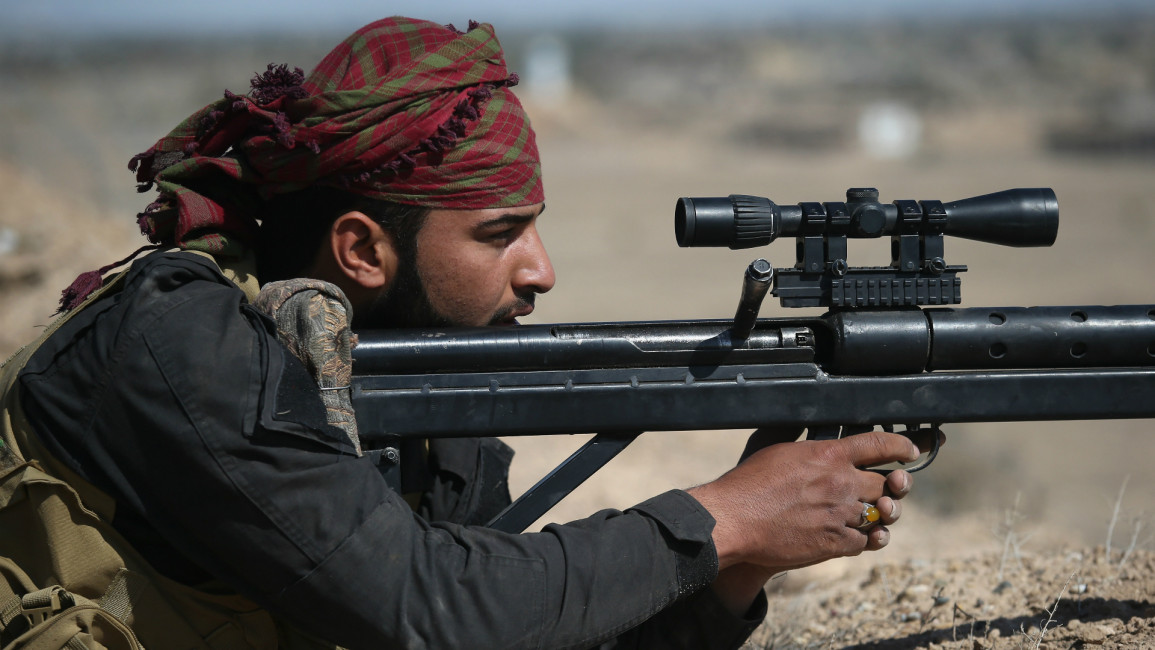Fighting in Iraq's Ramadi as tribes wait for arms
Sunni tribes preparing to fight Islamic State militants say they are still waiting for weapons supplies even as the battle intensifies for Ramadi in Anbar province.
IS fighters renewed their attack on towns east of Ramadi on Thursday.
A tribal source told Al-Araby Al-Jadeed that at dawn IS attacked the areas of Sufiyya, Bomahal and Borabee, firing Katyusha rockets and mortar shells.
The militants' push comes after Islamic State was dealt a major blow earlier this month, when Iraqi troops routed the group from Tikrit, Saddam Hussein's hometown in Salaheddin province.
Anbar provincial council chairman Sabah Karhut confirmed the arrival of two regiments of special forces to support troops battling IS.
The Governor of Anbar, Suhaib al-Rawi, denied reports that IS had seized control over Ramadi. Rawi said in a televised address that the city is under fierce attack by IS militants, and called upon the Iraqi government to arm tribal fighters.
Meanwhile, Sunni tribal leaders in Salaheddin province say they are struggling to prevent IS advancing again, forcing them to consider joining the largely Shia Popular Mobilisation militia, against the wishes of Baghdad.
"The sons of the tribes of Salaheddin fear that the militias will take control of areas that were liberate from IS, and that the government will refuse to give us weapons," Abdulrahman al-Faraji, a member of Salaheddin's tribal council, told al-Araby al-Jadeed.
"So they have decided to join the Popular Mobilisation militia, especially since the government has said that the militia is for all sects of the Iraqi people and not just one sect."
No refuge for the displaced
The fighting in Anbar has prompted a mass exodus from the province. Kerbala, a mainly Shia city, said it was open to refugee families from the mainly Sunni Ramadi.
Ghanim al-Aifan, the head of Anbar's tribal council, told al-Araby al-Jadeed: "The residents of Karbala have warmly welcomed the refugees into their homes and treated them graciously and hospitably. This crisis has shown the true nature of the Arab tribes in Karbala and in Iraq and the unity of Iraqis from all sects and ethnicities.
Nail al-Khikani, a Kerbala Sheikh, said: "Everyone is having to deal the country’s problems. We all have a common enemy and all Iraqis must unite against IS and against any foreign intervention that intends to harm Iraq."
However, refugees fleeing the province said Iraqi security forces had prevended them from entering Baghdad.
Security forces required them to provide proof of guarantors among relatives or friends inside the capital.
Abadi warns of 'regional war'
Speaking in Washington Wednesdasy, Iraqi Prime Minister Haider al-Abadi critisised the Saudi-led campaign against Houthi miltias in Yemen, warning that it could engulf the region in war.
Abadi, who met President Obama in Washginton, said US leaders "want to stop this conflict as soon as possible," but that convincing Saudi Arabia to halt its offensive in Yemen could be difficult.
With additional reporting by Associated Press.



